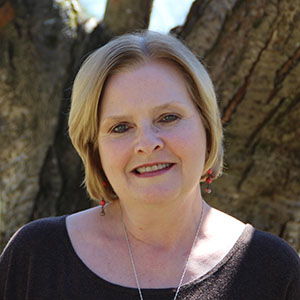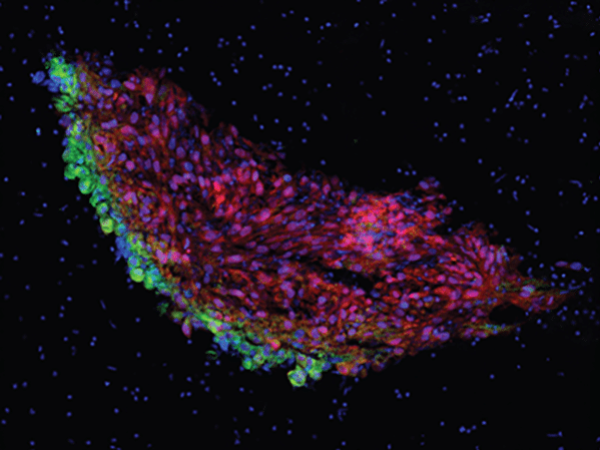Puzzling Progress: What Strides Look Like in Cancer Research
Guest Post by Cynthia Ryan, PhD
Past Mentor in the AACR’s Scientist↔Survivor Program (SSP)
There’s no denying that we continue to make progress in cancer research. The AACR Annual Meeting held each April alerts scientists, oncologists, survivors, advocates, journalists, and policymakers to work that offers the most promise in understanding, managing, and one day, eradicating cancer.
But to someone who doesn’t know much about the science of cancer, progress might appear to be less successful. Someone who is less immersed in the language of cancer research might wonder why the conversation about cancer seems to shift so often—one year, the answer lies in immunotherapy, while the next all eyes (and funding) are on bioinformatics and computational molecular biology. Why can’t researchers choose one path of inquiry and keep moving forward? And given the variety of experts now weighing in on cancer research, from biologists to physicists to social scientists to engineers, why are there still so many unanswered questions about a disease that claims more than half a million American lives each year?
As advocates whose primary responsibility it is to communicate messages about cancer to individuals, it’s important that we are able to respond appropriately to those who remain skeptical that cancer researchers are making strides. The following three points are building blocks of a single argument that might offer one possibility for convincing those who think we haven’t made much progress:
1. Cancer is an extremely complicated puzzle.
As we learned at the Annual Meeting Mini Med School session with Carolyn Compton, MD, PhD, “cancer evolution,” like “natural evolution,” operates on the premise that the fittest cells in the human body are the ones that survive over time. Despite the destruction they cause, cancer cells are considered “fit” because they overtake less aggressive cells (i.e., those occupied with following normal pathways and repairing themselves from any damage that incurs) and continue to replicate to take up residence in distant territories in the body. Plus, the ability of cancer cells to evolve means that even when new therapies are discovered to impede their growth, these cells develop alternative ways to thrive. Hence, new puzzles emerge at the same time as researchers are making headway in solving existing puzzles.
2. Solving complicated puzzles requires multiple ways of looking.
Anyone who has ever tackled a difficult problem knows that sometimes the best strategies are either to walk away from the problem for a while or to invite someone else to take a look. Fresh eyes and a fresh perspective can make all the difference.
One landmark scientific discovery illustrates this point nicely. In 1854, a cholera outbreak led to the deaths of hundreds in London’s Soho neighborhood. Many scientists and doctors at the time assumed that the disease was airborne and that there was little likelihood of containing it. But physician John Snow searched for another cause of the high incidence of cholera in this particular area of the city. He traced the outbreak to the Broad Street Pump, which was supplying contaminated water to residents in Soho. His perspective on the problem led to containment of the disease and an understanding of the way in which cholera is spread to humans.
Researchers have discovered the value of inviting others to the bench who approach the most puzzling questions about cancer through different lenses. These collaborators from engineering, mathematics, and physics bring new vocabularies, models, methodologies, and disciplinary understandings through which to frame problems and propose solutions.
3. Each time researchers discover a puzzle piece that seems to fit, they are contributing to a more comprehensive picture of cancer in all its complexity. These victories, large and small, propel us forward.
When we hear how many people around the world are affected by cancer, it’s easy to downplay the successes that have been made. Those of us in the thick of things know that many significant discoveries have changed the lives of people living with cancer and increased our knowledge about how and why cancers behave in certain ways.
For example, the breakthrough discovery in the early 1980s that a vast majority of cervical cancers were linked to the Human Papillomavirus (HPV) transformed an existing paradigm influencing cancer research. The idea that a viral infection could lead to the development of cancer was not an accepted idea at the time. As a result, the research took some time to take hold and a vaccine for HPV took longer to enter the marketplace (and the social mindset). But in 2008, Harald zur Hausen, MD, was finally honored with the Nobel Prize in Physiology and Medicine for his contributions to cancer research in this area. His discovery of the HPV-cancer link also paved the way for researchers to explore potential connections between other viruses and certain types of cancer. The effects of one discovery are multifold.
Cancer’s complexities are certain to puzzle us for a long time. But it’s crucial that those who are counting on answers recognize that piece by piece, dedicated researchers are, in fact, getting there.
Cynthia Ryan, PhD, is a past mentor in the AACR’s Scientist↔Survivor Program (SSP). The SSP is designed to build enduring partnerships between leaders of the scientific and cancer advocacy communities. The program is held at various AACR scientific meetings and provides advocates with special lectures using lay language, small group discussions, and other opportunities to exchange information on key aspects of cancer research, survivorship, advocacy, and public policy. Ryan is also a contributor to Cancer Today magazine, published by the AACR, and an associate professor at the University of Alabama where she runs a cancer education program for homeless women living in Birmingham, Alabama. She writes a blog entitled, “Cancer Hits the Streets.”





Though fewer people use tobacco worldwide, smoking remains the leading cause of preventable deaths from cancer.